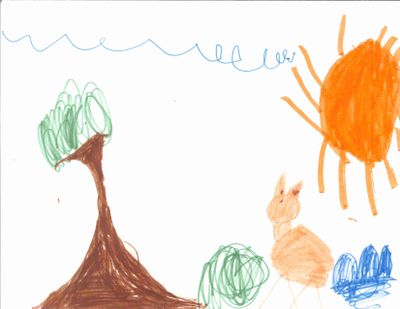Speak for the Trees, for the Trees Have No Tongues!

Happy Earth Day!
This past week I spent an entire day with kindergarten students studying healthy habitats, each eager to protect our planet. While preparing to relay the four basic components that make up wildlife habitat (food, water, shelter, and space) I reflected on Ecology’s mission.
The Mission of the Department of Ecology is to protect, preserve and enhance Washington’s environment, and promote the wise management of our air, land and water for the benefit of current and future generations. In order to fulfill our mission and move Washington forward in a global economy, the Dept. of Ecology has three goals:
• Prevent pollution
•Clean up pollution
• Support sustainable communities and natural resources
You’re right, that is a bit much for a 6-year-old to digest. So the basic message that I shared is that wildlife and people need access to clean food, water, shelter, and space. Here at Ecology it is our job, along with other natural resource agencies, to ensure that Washington’s environment is clean, healthy, and managed wisely.
To explain this concept to these kids I used an activity from a nationally known curriculum, Project WILD. Then, I read a well-known story, Dr. Seuss’s 1971 children’s classic, “The Lorax.”
In this classic tale, a daft businessman, the Once-ler, recounts his story to a young man about his encounter with the original spokesman for the environment, the Lorax. At first glance it seems to pit big business against the environment, but as always there is a moral to this story with a special twist.
“Ga-Zump”
The Lorax appears, with a “ga-Zump” in this story to “speak for the trees, for the trees have no tongues.” He shows the Once-ler how poor practices can affect habitats and the environment.
The Department of Ecology popped onto the scene in 1970, the same year as the first Earth Day as a matter of fact. We have come a long way in the last 41 years, speaking for the environment.
However, we know that a clean environment and healthy economy go hand in hand. We know that when we protect our environment, we also protect human health, communities and jobs in our state. More than one-third of Washington’s economy is directly supported by natural resources activities.
If you are interested in learning more about how we protect Washington’s environment you can keep up with us through our web site here. We have news, publications, videos and more.
“Unless”
Near the end of our story the Lorax gives up on the Once-ler. He takes leave to find a new place that his wildlife friends can inhabit. He searched for a place where there is enough clean food, water, shelter and space. But he leaves a small challenge behind, “unless.”
Our businessman, the Once-ler, takes this challenge to heart and passes the challenge on to the young man. He said, “Unless someone like you cares a whole awful lot, nothing is going to get better. It’s not.”
We know many of you out there who care a whole awful lot and we want to make sure you can meet the challenge of the Lorax.
You can start today:
• Find an Earth Day event near you and participate. Find a list here.
• Take the Shrink Your Carbon Footprint Pledge here.
• Learn about Toxic Free Tips for your household here.
• “Like us” on one or all of our Facebook pages to learn about how you can protect our environment: EcologyWA, Ecology’s Hanford Education and Outreach, Washington State Spills, Washington Waters – Ours to Protect, and Washington Beach Program.
• Follow @EcologyWA on Twitter!
• Have your voice heard. See our Public Involvement Portal here to find out how.
And those kindergarten students, well, they learned a whole awful lot. After hunting down all the components of a healthy habitat they were ready to share. Students drew pictures of their habitats that included clean water and fresh air in hopes that the Lorax and his friends would come back.
Brook Beeler is Environmental Educator with the Washington Department of Ecology’s Office of Communication and Education.